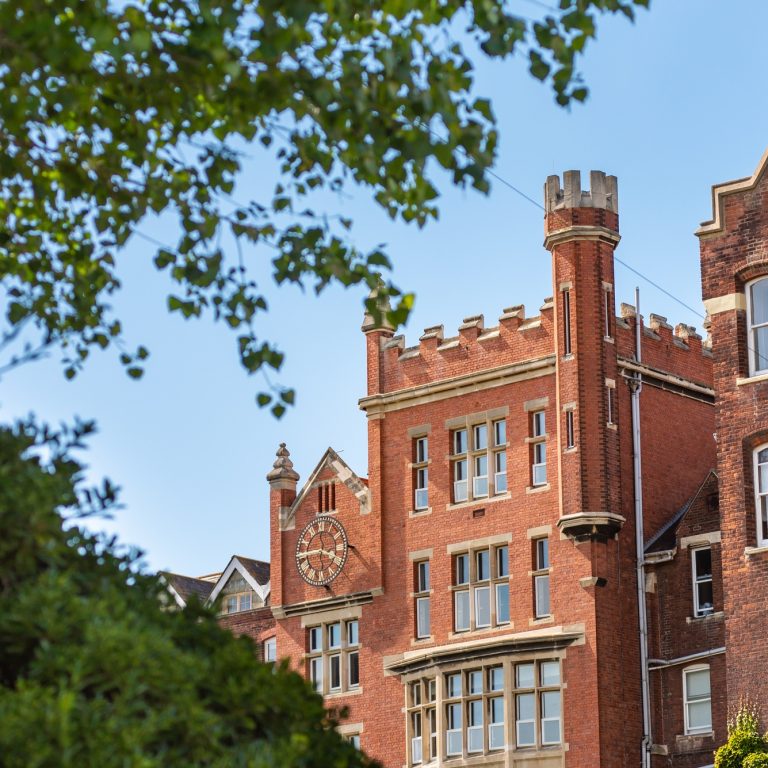Caring for our EAL students
Since around 26 different nationalities (or about 25% of the student population) are represented at St Lawrence College, the EAL (English as an Additional Language) Centre is a busy and thriving hub supporting around 60 pupils every year at various levels throughout the school.
The Department is staffed by 3 qualified and experienced EFL teachers, led by the Head of Department, Rebecca Castle. Our aim is to enable all international students to participate fully, and as quickly as possible, in the academic and social life of the school.
Our aims for your child
- To help every pupil towards confidence in the English language and to use it appropriately in a variety of different situations
- To broaden their knowledge and understanding of British culture
- To enable them to participate confidently and successfully in mainstream lessons
- To help them gain the necessary qualifications in the language in order to continue into higher education, whether in the UK or in their country of origin
To achieve these aims, it is vitally important that English is the common language for ALL pupils, whilst in class and at leisure.
Frequency and duration of lessons
During the first week of the new school year, all international students will be given a short-level check test and the scores recorded. This will enable us to place students quickly into an appropriate class.
All international students in Years 7 to 11 (First to Fifth Form) needing extra English have four 55-minute lessons per week. They will be placed in an appropriate EAL class which is normally timetabled against French and/or Latin. There may also be an extra EAL option offered to students starting courses in the Third Form, giving a further 3 periods of EAL.
Students entering the College at Sixth Form level (Year 12 to 13) receive 2 x 55-minute periods of tuition per week and are divided into small groups according to their A level option blocks and placed in a suitable IELTS class.
Course structure
The EAL programme is built around the suite of Cambridge examinations for international students, beginning with the KET or PET examinations (Year 7 and 8 pupils) and moving on through IGCSE / E2L in Year 11 (equivalent to a GCSE pass as far as university entry level requirements are concerned) to IELTS, which is a qualification required for university entrance in the UK, Australia and The United States. There is an option to take Cambridge first/advanced level in Years 10-13 if appropriate.
About the Cambridge Examinations
KET
The KET (Key English Test) examination tests ability in reading, writing, speaking and listening at A2 level. Successful candidates can handle basic information, take a simple message, understand the main points in a travel brochure and ask and answer simple questions.
PET
The PET (Preliminary English Test) is a B1 examination designed to test students’ knowledge of English in real-life situations: writing informal letters, reading magazine articles, giving directions, and so on. A challenging exam, in which accuracy is very important, particularly as the pass mark is 70%.
B2 First
This is the most popular Cambridge Exam and is accepted widely for entry onto Foundation and Pre-sessional courses in English speaking countries, and for entry onto Undergraduate programmes taught in the medium of English in non-English speaking countries.
A B2 First qualification shows that a student can communicate effectively face to face, expressing opinions and presenting arguments, as well as write clear, detailed English in a variety of letters, reports, stories and other types of writing, expressing opinions and advantages and disadvantages of different points of view.
This qualification is ideal for pupils who are not in school for a long enough period to study for the GCSE 2-year course, as the exams are held throughout the academic year.
IGCSE English As An Additional Language
The GCSE in English as an Additional Language assesses students’ ability to use English as a medium of practical communication: candidates will be expected to understand and produce a wide range of language styles to communicate appropriately. All four skills of Reading, Writing, Listening and Speaking are assessed in an equally weighted paper. Our international students will generally sit the examination at the end of the 2 year GCSE course in Year 11 (Fifth Form).
In our 2023 cohort of students, 100% achieved grade 7 or above, and 70% achieved grade 9.
IELTS (International English Language Testing System)
This is an examination for advanced-level students, generally taken from 17+ years onwards. IELTS is scored on a nine-band scale and for undergraduate studies in Mathematics, Sciences, Economics, and Business Studies, students will need to obtain an overall Band Score or at least 6.5. A challenging qualification, which involves candidates being able to use English confidently in a range of academic contexts: note-taking and expansion, presenting seminars, data analysis, report writing, and discursive essays. Band scores range from Band 1 (Non user) to Band 9 (Expert user).
All pupils in Years 10-13 requiring any teaching in courses that are for four or more periods, or for courses that lead to one of the following accreditations, will be charged £569 per term in the academic year 2024-2025. Please visit our fees page for all fees information.
Public Examinations Fees & Dates
*Fees are approximated as the Examination Board announces exact annually.
KET, PET & FCE * £186
Sessions available in December, March & June every year
IGCSE 2 L* £74 approximately
Sessions available in May 2023
IELTS* £195
Sessions available throughout the year.
Contact us for more information: rjc@slcuk.com.







